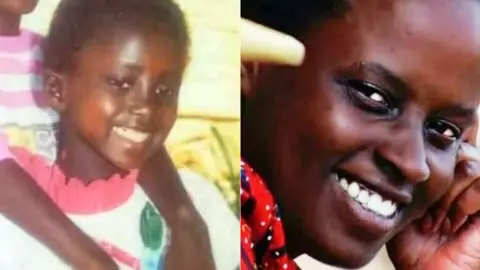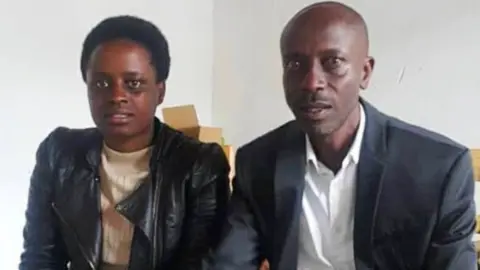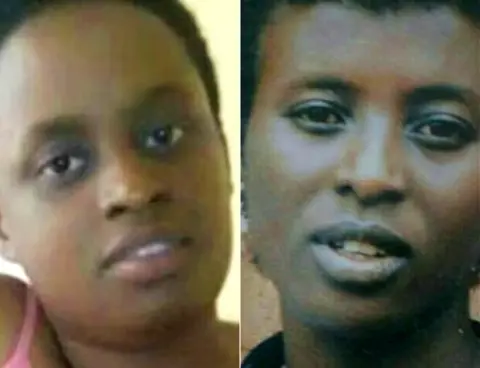Rwandan genocide orphan's 'miracle' WhatsApp reunion
 Grace Umutoni
Grace UmutoniA girl who was orphaned at the age of two during the 1994 Rwandan genocide has recently found some of her relatives thanks to the "miracle" of social media.
Grace Umutoni, who did not know her birth name, put up several photos of herself on various WhatsApp groups, Facebook and Twitter in April to see if she could track down members of her family - having failed to find them through more official routes.
All the 28-year-old nurse knew about her background was that she had been brought to an orphanage in the capital, Kigali, from the city's Nyamirambo neighbourhood, with her brother, who was four at the time and later died.
There are thousands of children like Ms Utomoni, who lost or were separated from their parents during the chaos of the genocide in which more than 800,000 ethnic Tutsis and moderate Hutus were killed in 100 days.
Many are still searching for clues about their family - sometimes made even harder as families don't traditionally share surnames.
After she posted her photos, a few people claimed to be relatives - but it was only several months later that someone came forward who sounded plausible.
Antoine Rugagi had seen the photos on a WhatsApp group and contacted her to say that she looked very much like his sister, Liliose Kamukama, who was killed in the first days of the genocide in April 1994.
'The miracle I have prayed for'
"When I saw him, I also saw how we looked alike," Ms Umutoni told BBC Great Lakes about the man who could be her uncle.
"But only DNA tests could confirm if we were related, so we went to take these in Kigali this July."
Ms Umutoni travelled south from Gakenke district where she works and Mr Rugagi came from his home in Gisenyi in the west so that they could pick the results up together.
 Grace Umutoni
Grace UmutoniIt proved to be a big day for both of them as the tests showed there was an 82% chance they were related.
"I was shocked, I could not hold myself from expressing my happiness, even today I think I am in a dream, it was the miracle I have always prayed for," says Ms Umutoni.
Her newly found uncle told her that the name given to her by her Tutsi parents was Yvette Mumporeze.
He was also able to introduce her to relatives on her father's side of the family.
This included Marie Josée Tanner Bucura, her paternal aunt, who has been stuck in Switzerland for months because of the coronavirus pandemic.
 Grace Umutoni
Grace UmutoniEven before the DNA test results were out, she was convinced that Grace Umutoni was her niece after comparing her photo to those in an old family album.
"This girl was clearly the daughter of my brother Aprice Jean Marie Vianney and his wife Liliose Kamukama. They were both killed in the genocide."
'We thought no-one survived'
Mrs Bucura was also able to tell her that the full name of her brother who went with her to the orphanage was Yves Mucyo - she had only remembered his first name - and that she had also had a one-year-old brother called Fabrice.
The genocide began after a plane carrying the presidents of Rwanda and Burundi - who were both Hutu - was shot down on the night of 6 April 1994, and the killings started the next day.
Hutu militias were told to hunt down members of the minority Tutsi community - and the suburb of Nyamirambo in Kigali was one of the first places to be targeted.

You may also be interested in:

People were killed, often with machetes, in their homes or at roadblocks set up to vet those fleeing - some managed to make it to the safety of churches and mosques in Nyamirambo in the mayhem.
Mrs Bucura says that someone had spotted a woman grabbing Yves' arm and running - but they could find out no more information. Nothing was known about his sister.
The genocide ended in July 1994 when the Tutsi rebel group, the Rwandan Patriotic Front (RPF) led by now-President Paul Kagame, took power.
"We thought no-one survived, we even have been mourning them every April on the anniversary of genocide," Mrs Bucura explains.
As she grew up, Ms Umutoni was unable to find out any more details as Yves died not long after arriving at the orphanage. She was told that he had succumbed to his injuries as he had been shot whilst escaping from the Hutu militias.
At the age of four she was adopted and raised by a Tutsi family in the south of the country, who named her Grace Umutoni.
'I lived in sorrow'
"At high school officials helped me and went back to the orphanage in Kigali to ask if there were any trace of my past, but there was nothing," she says.
"I have always lived in sorrow about being someone with no roots, but I kept praying God for a miracle.

"However good the adoptive family treated me, I could not hold myself from thinking of my biological family, but the only referral I was told was the name Yves and Nyamirambo - too little information to even start a search."
She is curious to know more about her parents - and a big family reunion is planned to bring together relatives from all over Rwanda and elsewhere, though coronavirus has delayed the gathering.
In the meantime, she is being introduced, mainly via WhatsApp, to other relatives and cousins - and has discovered she has an older half-brother who lives in Kigali.
Her father had him from a previous relationship before his marriage.
'We are grateful to her adoptive family'
Since 1995 nearly 20,000 people - most of them children - have been reunited with their families by the International Committee of the Red Cross (ICRC).

"We still get requests from genocide survivors who were registered at different orphanages," its spokesperson in Rwanda Rachel Uwase told the BBC.
Since the start of 2020, ICRC has reunited 99 people who had not seen their families for more than two decades.
For Mrs Bucura, the discovery of her niece's survival is a time to give thanks.
"We are grateful to the family that gave her a name and raised her," she says.
Grace Umutoni says she will stick with her adoptive name as that is how she has been known for most of her life.
But she is forever grateful to social media for giving her a sense of belonging.
"I now regularly talk to my 'new' family - my cousins, aunts and my brother," she says.
"I have spent all my life feeling I had no roots.
"But now I feel blessed to have both my adoptive family and biological family who both care about me."
